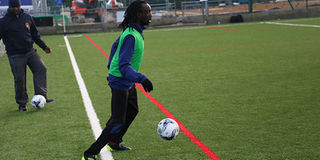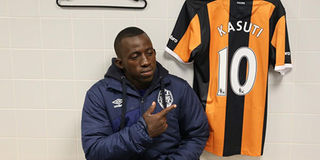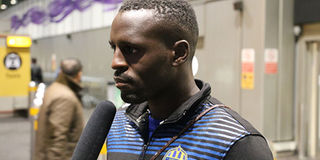Hull friendly lays bare gulf in class and facilities
What you need to know:
- It wasn’t a big game by local standards.
- Hull City, a small, relegation-battling English Premier League club from the midlands playing SportPesa All Stars, a team comprising local-based players drawn from various clubs last Monday.
- But it merited numerous mentions on the airwaves of local radio stations in Kingston upon Hull and back home, the buzz reached feverpitch.
- Social media, the new-found barometer of status in Kenya, was alive with raucous comments and varied opinions before the match and long afterwards, never mind the difference in time zones between Kenya and Kingston upon Hull, the venue of the match.
It wasn’t a big game by local standards.
Hull City, a small, relegation-battling English Premier League club from the midlands playing SportPesa All Stars, a team comprising local-based players drawn from various clubs last Monday.
But it merited numerous mentions on the airwaves of local radio stations in Kingston upon Hull and back home, the buzz reached feverpitch.
Social media, the new-found barometer of status in Kenya, was alive with raucous comments and varied opinions before the match and long afterwards, never mind the difference in time zones between Kenya and Kingston upon Hull, the venue of the match.
But beside the obvious excitement that anything related with EPL football elicits among Kenyans, the game between Hull City and SportPesa All Stars was wonderful for so many reasons.
Specific stadia
Seeing Kenya’s best local-based players struggle to match the challenge brought forth by a youth team from Hull City made clear the competitive distance between the Kenyans and their opponents.
“Kasarani? I would never let my boys train there. By the way, why would you have one stadium hosting all kinds of sports? Why not just build specific stadia for specific disciplines? I was very surprised at Kasarani because when we had our early morning training, I could see athletes ruining around on the athletics track, there were javelin throwers aiming dangerously just next to where we were and there were all these fellows going about their business I was just really surprised,” Hull City’s Under-18 coach Richard O’Donell told me when I asked him what he thought about the playing surface at the Moi International Sports Centre in Kasarani, Kenya’s best football facility.

SportPesa All Stars player Moses Odhiambo during the team's training session at Hull City grounds, in Kingston upon Hull, England last week. All Stars face Hull City in a friendly match on Monday February 27, 2017 at KCOM Stadium. PHOTO | COURTESY |
Coming from an outsider, it was a piercing, harsh and almost offensive opinion, but it told you everything you need to know about the gaping differences between football life here in Africa and football life away in Europe.
Imagine a team like Hull City, one that gained promotion to English Premier League just eight short years ago, establishing itself as a football club of mighty proportions by Kenyan standards, never mind that it doesn’t even command as much support from Kenyans as favourites Arsenal, Manchester United, Chelsea and Liverpool.
That little Hull City can have a fully functional secretariat complete with an IT, Public Relations Department, Sports and Science departments, that it can have full-time programmes for U-18 and U-23 development teams, that it can have players from those youth teams run over Kenya’s best talents says something about the state of football in our country.

SportPesa All Stars striker Allan Wanga (left) fields questions from journalists after arriving at London’s Heathrow Airport on February 22, 2017. His side faces Hull City on Monday in Kingston upon Hull. PHOTO | COURTESY |
Battling relegation is not a good indicator for any team but Monday’s game against our own All Stars proved that even though Hull City may be strugglers in the English top-flight league, its youth team players can still outsmart the best we have locally.
And the blame cannot be left to rest on players’ shoulders.
“I was there and yes, there is immense talent in Kenya. No doubt about that. Kenya is in Africa and Africa has produced some of football’s greatest idols so there is no doubt about the football potential to be discovered from there.
“I think however that leadership, good policy and governance is critical if any good results are to be achieved. With more open mindedness and more sincerity from all stakeholders I think Kenya can become a great footballing country,” said 47-year-old Dean Windass, a former Hull City legend who was integral in the selection of the 18 SportPesa All Stars players.
NEW AWAKENING
It came as a matter of big concern to me and my colleagues that SportPesa All Stars were barred from holding any training sessions at the famed KCOM Stadium until the day of the match.
It came as a new awakening that “feeling the pitch” is a term that makes no sense outside Africa, and it took hours of explaining to get the Kenyan contingent to understand how important it is to keep playing surfaces sacrosanct.
KCOM Stadium, the home of Hull City Tigers, is only used during match days and double headers are allowed only three times a year, on the rare occasions that the junior sides play a match immediately after the senior team.

Cliff Kasuti at the KCOM Stadium changing room. PHOTO | COURTESY |
“What? That would be too much stress on the grass,” Hull City’s Professional Development Phase coach Terry Boyle told me when I informed him that there are plans to have triple headers introduced in Kenya once the expanded premier league format is adopted.
“This stadium is used only on match days. The senior team and every other team trains at the college unless on very special occasions which must be communicated in advance and permission granted.
“There is also a policy that entertainment performances be limited to only about two every year, and they must be during the off-season breaks. That way we can have the grass ready again when the games return.
His comments transported me back to Kenya where political rallies, overnight entertainment concerts and lengthy prayer sessions are allowed to happen even on the eve of a match, leaving the grass flattened and sparse regardless of the impact that would have on players’ performances.
After the highly publicised match, All Stars captain James Situma intimated that the pitch at KCOM was unusually fast and supple, which he believed was the reason his team mates were getting outrun by the opponent.
“That pitch is perfect. The ball bounces so easily and one finds it easier to run on it. I think that is why they were beating us at pace. Because they are used to that kind of surface and we are not.
“During the initial training sessions at Kasarani, the (Hull City coaches) always asked us whether we had any blisters. I remember getting very surprised because for me, Kasarani surface is so good that I can even play barefoot. Now I understand where they were coming from,” he said in retrospect.

SportPesa All Stars defender James Situma fields questions from journalists after arriving at London’s Heathrow Airport on February 22, 2017. His side faces Hull City on Monday in Kingston upon Hull. PHOTO | COURTESY |
But such infrastructure obviously doesn’t just fall from the skies.
At Bishop Burton College and University of Hull, which are institutions that have partnered with Hull City club, the management there sets aside millions of pounds every financial year for the maintenance of its pitches and for general development of sports.
The result is that those colleges currently have a total of eight full size football pitches, all of them with playing surfaces that truly surpass that of Kenya’s best pitch in Kasarani.
The club also realises substantial amounts from gate collection and television rights, which they then use to fuel the opulence with which they operate.
During the match between the club and Burnley two days before the Kenyan match, there were 21,650 fans inside the stadium, and tickets went for 33 pounds (around Sh4,257) each.
That means that the club realised close to Sh100 million from that game only, which is nearly five times more than Gor Mahia makes from gate collection every season. Imagine how much more the club could make in just one season!
LACK OF STRATEGIC MARKETING
Yet stadium attendances in Kenya and indeed all around Africa continue to dwindle every day. It appears that the only time clubs can realise good attendance is during football derbies, and even that has been diminishing due to hooliganism, lack of strategic marketing and unexciting performances dished out to the spectators who come to view the match every day.
At the academy, there are eight part-time teams for children between 9-16 years who train on evenings and play every other weekend.
The U-18 and U-23 teams operate on full-time basis and train every day. The academy teams are all entitled to the services of full-time physiotherapists and fitness, strength and conditioning coaches.





